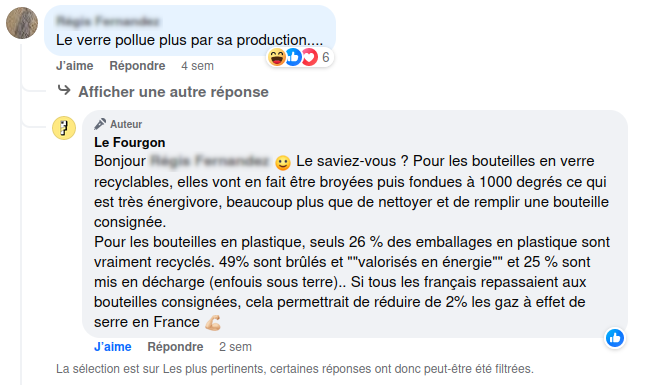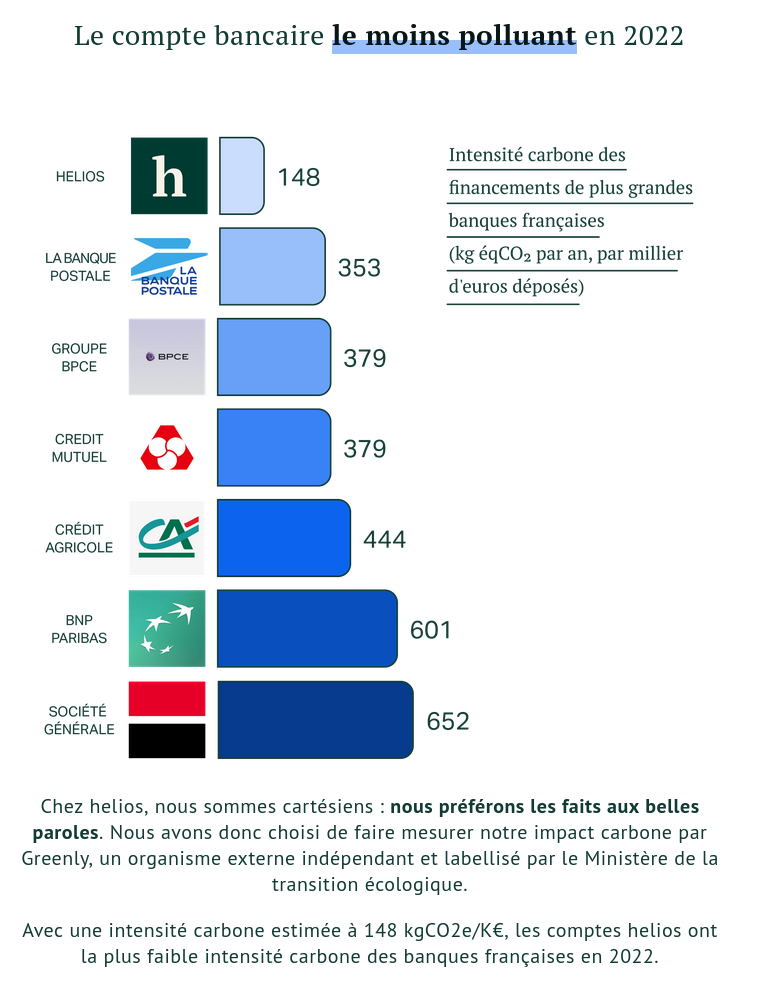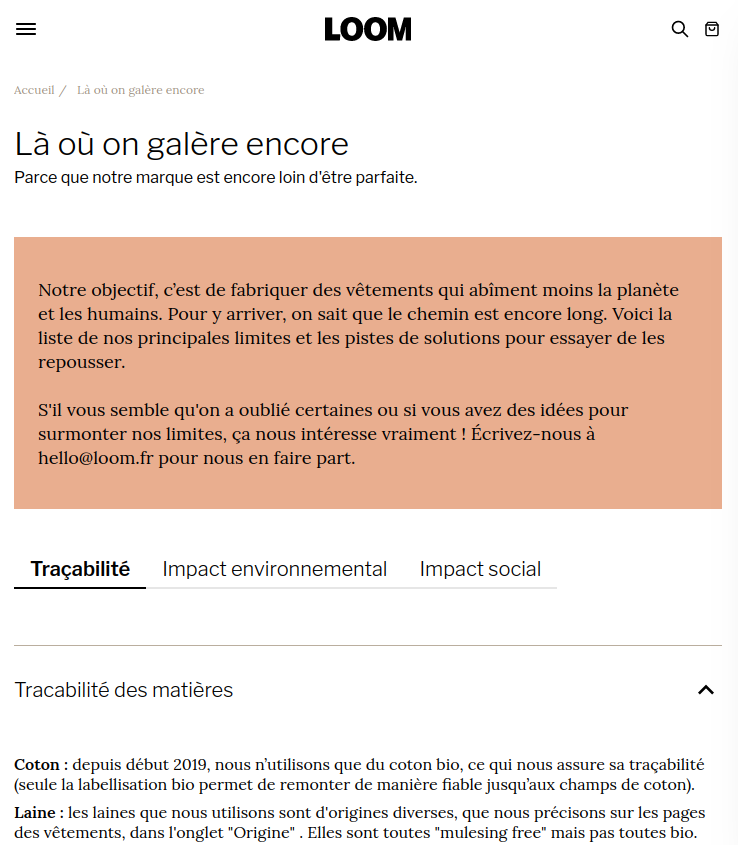The other day, I came across a Facebook post by Le Fourgon. You know, that impact company that's bringing the deposit back into fashion (see the podcast we published with them). And like so many positive-impact company posts, it's a discussion. It's nitpicking, and it's questioning the very principle of the model.
And then yesterday, I was listening to Nabil Wakim's excellent podcast "Chaleur Humaine" (yes, there's the word podcast in every paragraph). He was talking to sociologist Laurent Cordonier, who says in the middle of his interview that you have to demonstrate rather than communicate.
Here, Laurent Cordonier was mainly talking about what scientists and journalists are saying about the ecological emergency and the reality of climate phenomena. But ultimately, when you're a company with an impact, when you've set social well-being and respect for planetary limits as your goals, isn't that one of the keys to your success? responsible marketing than forcing ourselves to demonstrate rather than communicate?
At the time of writing, Marion and I are more than 19 episodes into our podcast Sobriété et Marketing. Our aim, in addition to training and participating in frescoes and other 2-tonne workshops, is to design a new way of communicating and marketing. To create methodologies and convictions that will enable our responsible communications agency to be right. And that's just as well, our own editorial charter defined that our brand posture should resemble (dixit) "a militant college professor". Demonstrate rather than communicate.
Before going any further, let's get down to basics.
What is an impact company?
An impact company is an organization that goes beyond simply limiting its negative impact, and integrates social and ecological objectives into its core business. It may aim for economic growth, but it does so while preserving humanity's ecological and social capital. These companies combine economic efficiency (because going bankrupt doesn't help them pursue their business) with social responsibility. corporate purpose), social justice and ecological transition, responding to the urgent need to transform the traditional business model.
It's always important to define what we're talking about 😉 By the way, if you want to delve deeper, I highly recommend reading the Manifesto of the Impact France Movement.
Proving the legitimacy of an impact company
The question of legitimacy is always central. Whether we consider ourselves an impact company, an eco-responsible company... the legitimacy of our commitments is constantly called into question. Because asserting our values offers our detractors plenty of angles from which to attack us.
Unfortunately, "business as usual" seems easier to manage. The utilitarian world in which we live finds it more legitimate for a company's primary aim to be "making money". As soon as objectives become environmental or social, they become open to criticism. It seems that in the minds of many of our fellow citizens, in the corporate world, if you're not a shark, you're suspect.
From then on, the impact company is doomed to prove its legitimacy. Every time you speak, you have to think about how to cut criticism short. Give proof of good faith. But that doesn't stop some (often well-organized) oddballs from going on the attack.
Need help?
Reading content isn't everything. The best way is to talk to us.

Demonstrate. Not just communicate.
The impact company cannot simply communicate. It must demonstrate that its action is solid. That its claims are verifiable. Communication must serve the truth. The approach is "quasi-journalistic".
In fact, I recommend that you read or reread the various charters published on the Conseil de Déontologie Journalistique website and Mediation. Of course, you're still communicating, talking about your company or your brand. But the world of journalism has a way of thinking about information processing that can be useful to any good communicator.
In philosophy, a demonstration is a line of reasoning that establishes a truth. (we're into social science these days). I'm not a philosophy teacher, but a demonstration normally starts with a generally accepted truth. So that's your starting position, to tell the truth. Then you need to be able to develop a chain of reasons. A chain of reasons that aims to demonstrate that impact products and services really are more positive for our society than their traditional equivalents.
You're not just driving for your brand and your products. You need to demonstrate that another, more virtuous economy is possible and desirable.
(Which reminds me, it's about time we invited a philosopher into our company. our "Sobriety and Marketing" podcast. To be continued)

In practice, how do you go about it?
In impact communication, there are a few basic principles that will allow you to demonstrate, as well as communicate :
- A posture of truth : If you want to demonstrate, you have to be right. You have to start by asserting. Assert your values, assert real characteristics, assert the positive impact... of your products and services.
- Staying humble Express the known limits of your impact. Say you're not perfect, express what still needs to be improved in your model. And if you're working on future improvements, say so. But be careful: you can't just rely on the future. If you want to be legitimate today, your positive actions don't just have to be in the future.
- Propose figures What can be measured, can be stated clearly (a slight variation on a well-known maxim). Whether it's your carbon footprint, the composition of your products, your water consumption... present the figures. They demonstrate your willingness to be factual. Numbers are more than words, they are proof.
- Prove your trajectory : Related to numbers, but not only. Explain where you come from. What's your approach, what considerations have led to your positioning. Explain and demonstrate how far you've come, and how far you still have to go.
- Sourcing your claims : Take the most scientific approach possible. Are you working on planetary limits? Do you have a regenerative approach? Suggest scientific sources that will not only contribute to an ongoing reflection, but also to the cultural knowledge of our fellow citizens on the question of social and environmental impacts.
- Empowering the consumer If change is to be driven by government and business, citizens need to become aware of their role. Their role as consumers, but also as users. We need to support them in their use of products and services.

You don't do all this demonstration work directly for your most virulent detractors. They are often no longer rational and work for a social project that is incompatible with yours. You do this work for the undecided. All those people who would like to consume in a more positive way, but who are at a crossroads and don't know exactly who to believe.
They have little faith in traditional marketing messages. So you have to convince them, but through rationality. You have to convince them that replacing a traditional product or service with its impact equivalent really does have... an impact!

